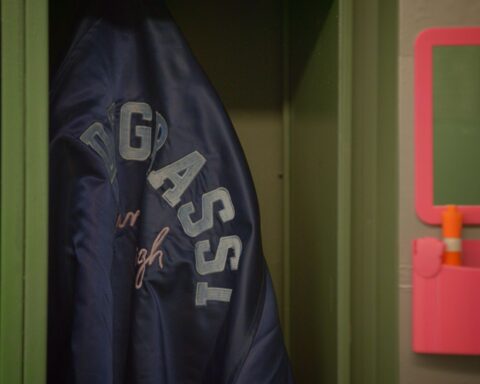When Ryan Larkin died on Valentine’s Day 2007 after a struggle with cancer, he left behind a legacy of lore that eclipsed his astonishing body of work. Yes, he’d been nominated for an Oscar in 1969 for Walking, the film many consider his defining masterpiece. But his work became secondary when people wrote about Larkin. It was the stunning collapse of his personal life that was irresistible to writers and filmmakers—he had gone from highly praised filmmaker to panhandling drunk. Larkin’s rough-and-tumble existence, his work and substance abuse made him fodder for Chris Landreth’s 2005 film Ryan, which would win the Oscar for best ani- mated short.
In person, Larkin was as unusual as one of his drug-influenced films. Alternately charming and abrasive, he could tell a funny story or read you a poem, but then raise his voice in a flash of anger if he felt you were asking too pushy a question. You could look at Larkin as an innocuous drunk, a man who was happy with who he was and his simple but meagre existence, or you could cringe thinking about the squandered opportunities his decades of destitution on the street represented. Another contradiction: he was strangely child-like, even though when I first met him, in 2005, at his daily drinking hole The Copacabana on Montreal’s St. Laurent Boulevard, he was 61.
By this point, Larkin was past his cocaine addiction. But he was still an active drinker, insisting I wouldn’t get an interview unless I bought him a couple of rounds. He was two-fisting, downing beer with one hand while gulping on hard-liquor- infused espresso coffee in the other. This process was occasionally interrupted so he could tend to his cigarette. Larkin pulled from his bag a piece of a cigarette pack, on which he’d written a poem about his life. “I was losing my keys,” he read to me. “I lost my keys. When you lose your keys, you can search everywhere for them. You’ll only find them in one place. There are no excuses and no one to blame. I lost my keys, is all, and now I’ve found them.”
Whatever his contradictions, make no mistake, Larkin’s story was epic. There was something about him that was so cinematic. He had a reversal of fortune that was of Grey Gardens proportions and the pathos of his story matched The Kid Stays in the Picture. I met Larkin after Ryan had been nominated for an Oscar, and there was great anticipation that the film would win. But the attention this unusual animation-documentary hybrid was getting was managing to obscure the documentary that the NFB had commissioned as well. Titled Alter Egos, this hour-long doc by Toronto-based filmmaker Laurence Green expanded the story of Larkin.
Saving private Ryan
With the two variations on Larkin’s life came com- peting mythologies. Watching Ryan, one wouldn’t necessarily pick up on the fact that the man was queer. But Alter Egos, which also casts a more pessimistic view of Larkin’s odds at a comeback, makes his sexual orientation clear. As one woman, a former lover of Larkin’s, argues, attitudes towards his homosexuality had a profound impact on him.
Though Larkin was pretty upfront about his sexuality, he was honest about most things, including his ongoing boozing. When I asked him about working with animation wizard Norman McLaren—widely regarded as one of the most influential animators ever—Larkin confirmed that the mentorship included stints in bed, with McLaren and McLaren’s boyfriend. “I’ve had relationships with both men and women,” Larkin said. “I find that women tend to be much, much more manipulative. But I’ve been used by both.”
Larkin’s realization that he was queer wound back to his adolescence. A gifted child, Larkin’s parents didn’t entirely know what to make of his keen artistic sensibility, but did their best to foster his skills. He studied under painter Arthur Lismer at the Ecole des beaux-arts de Montreal. It was then, Larkin told me, that he began to hustle as a young man. “I was nice looking. The older men liked me. I enjoyed the attention and I liked the sex. I used to go out on the highway and hitch. A guy would pick you up, you’d talk money and then you’d have sex with them.”
But Larkin knew that what he was doing would be frowned upon, especially by his parents. He knew that this was something he had to keep hidden and buried—literally. “I actually made some not bad money doing that. I hid it from my parents. I dug a hole in the back yard, put the money in a tin and then buried it there. They never found it.” Then Larkin looked up at me and smiled, shaking not out of nervousness but due to years of addiction. “Don’t print that now. Wait till after I’m dead to print that, okay?”
The reason for Larkin’s descent into what most would consider truly bad times remains a mystery. Was the man a bit mad? Did being queer in such a repressive time prove too much for him, as it had for many? Was it a basic case of severe addiction? Or some combination of all three?
Don’t cry for me
But Larkin was never one for self-pity. He knew how he appeared to others—a train wreck—but always insisted he was happy panhandling and chugging beer. At many times in his life, Larkin appeared to have a self-destructive streak. There was his break with the NFB, which had been paying him to work from home, as well as a telling story that’s recounted in Alter Egos. In the early ’70s, Larkin had been commissioned by a feminist group to draw a mural on their drop-in centre wall, which he happily did. The unveiling came as a surprise however: Larkin had drawn a teenaged boy sporting an erection. Larkin told me the members of this women’s group were none too pleased.“I thought it was funny, but they didn’t. They were taking themselves far too seriously.”
Larkin held that he was always on the cusp of a comeback, even while sucking back his eighth round. To prove it, he handed me a business card. Then he asked for it back. “I only have one,” he explained.
There was a classic Larkin moment that happened one night during screenings of his work. In October of 2005, the Festival du Nouveau Cinema showed several of Larkin’s films, as well as Alter Egos, in tribute to him. At one point in Alter Egos, Montreal filmmaker Tanya Tree (the woman behind the landmark documentary The Things I Cannot Change and an old friend of Larkin’s) estimates that Larkin is not a happy person.
Sitting in the audience, upon hearing this Larkin almost dropped his flask. “FUCK OFF!” he screamed at the screen, “I’M HAPPY!”
I was sitting in his row, just a few seats away from him. Some in the audience giggled nervously. No one was entirely sure of how to respond. We didn’t know if we should be laughing or crying.









